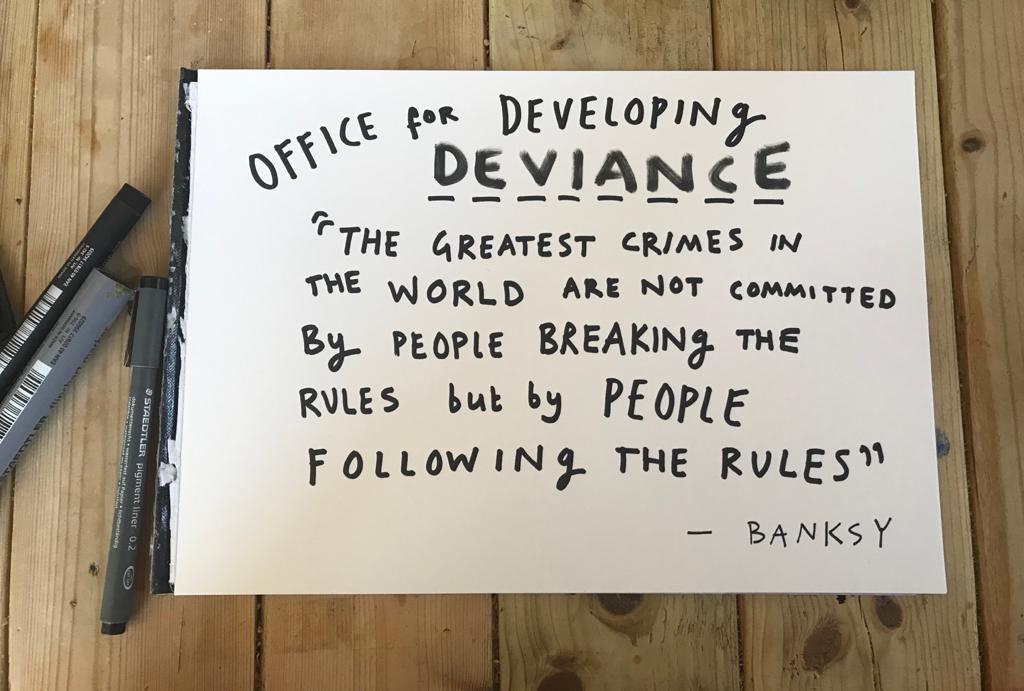The Department for Civil Imagination: An institution for reshaping realities in poetic, practical and political ways
What is possible to imagine? In the RESHAPE project, one of the thematic groups is dealing with the topic of Art and Citizenship, questioning how can art radically reimagine new forms of citizenship and empower us to act. In order to facilitate this process of imagination and empowerment, they imagined an institution, a fictional department with real life impact, resourcing the ‘civil imagination’ as a radical act to reshape realities in poetic, practical and political ways. The Department for Civil Imagination (DCI) was officially launched at an online Assembly or “House Party” on 31 May together with fellow Reshapers. Peter Jenkinson, the self-appointed DCI Secretary of WE-Making, shared the statement:
The DCI currently has ‘branches’ in Belgium, Bulgaria, Germany, Greece, Hungary, Italy, Portugal, Switzerland and the UK, active across the arts, migrant activism, global municipalities, radical pedagogy and cultural management. It is a manifestation from the Reshape Network - funded by Creative Europe and multiple partners from across Europe. But it is not owned by anyone and is an invitation to everyone as a tool of empowerment and an umbrella for solidarity among individuals, local groups and engaged citizens as a playful resistance to countries and regions closing in on themselves and to institutions competing for funds and space. There is an urgent need to develop our individual and collective capacity to discover an otherwise possible; to elaborate alternatives; to see what could be but is not yet.
There is an equally urgent need:
- for hope and agency;
- for a shift of the discourse on leadership towards a feminised, collaborative and systemic approach to the complexity of a crisis;
- for skills of crisis management and resilience;
- for prototypes of the role of cultural work in crisis and recovery;
- and a need for stronger connections among cultural and other sectors in developing more responsive, flexible and effective policies.
Thus DCI is an invitation and frame to share and expand across Europe and beyond and a playful reclaiming of civil and cultural power and the possibility to reimagine our shared futures.
This inspiring opening was followed by the walk through the rooms that the Department currently has or is starting to assemble: Critical Care Unit, The Ununiversity of Unlearning and the The Office for Developing Deviances. The virtual walk through these growing rooms ranged from a storytelling session, a mixed media exploration across music and plants, and a small attempt of collective social fiction. Each of the rooms houses some of the ideas that seem relevant for reimagining our post-crisis infrastructure.
Critical Care Unit
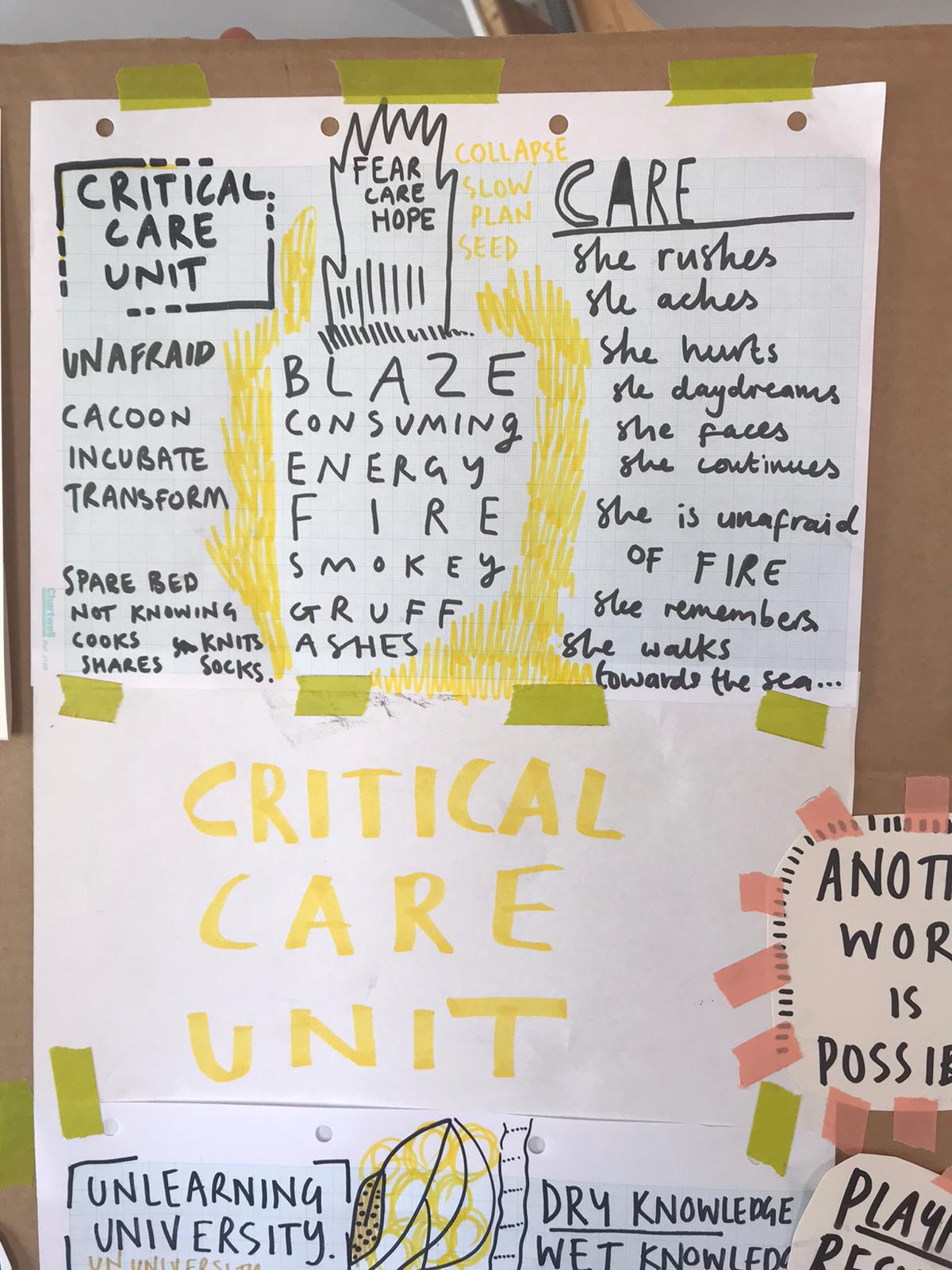
Maria Vlachou made an introduction to the Critical Care Unit that is being shaped by her, Ana Alexieva, Chiara Organtini and Joon Lynn Goh. This room places the lens at the act of caring, especially in difficult times when the future is not so clear and when the unpredictability of things makes us feel insecure. The questions shaping the space of that room are: Why do transformations call for care? What type of care? Who cares and for whom? The Critical Care Unit, in that sense is a room for careful observation, closing wounds, for healing, for opening new cracks into the unknown… To understand why care Joon Lyn, Ana and Chiara read The Story of Care that is available here.
The introduction to the Critical Care Unit of The Department was round up with a set of questions that will further shape the landscape of that room: Why care? What makes us care? What mobilizes us? What is it critical for the future we want? Are we able to acknowledge our communities’ needs and address them? How can we show care? What role can our imagination and creativity play? Can we learn from strategies of care that already exist? How can we embody care and practice care? And what about all of you, what would you like to explore in a room like ours?
The Unlearning Ununiversity
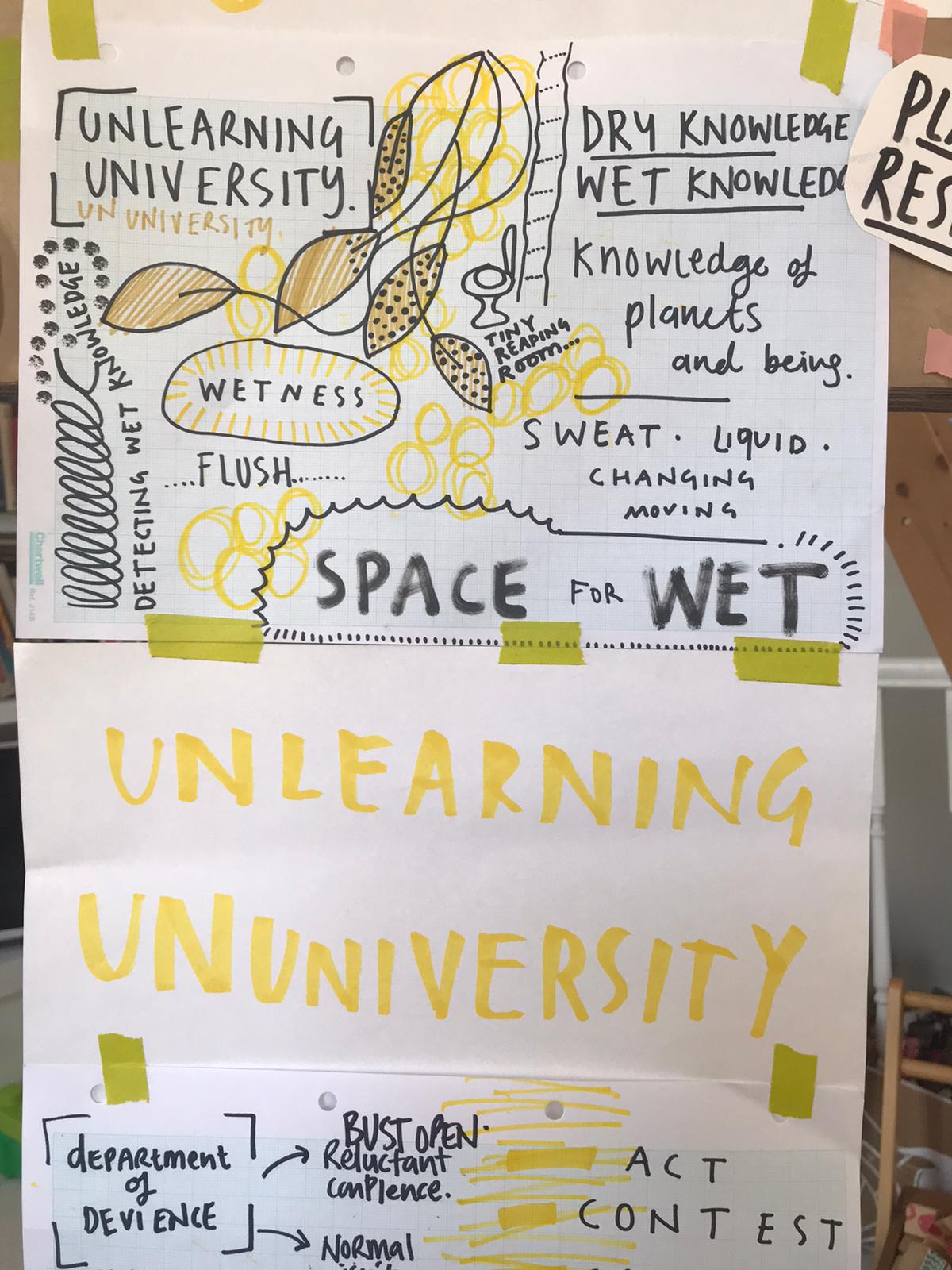
The second room of the Department we were invited to was the Unlearning Ununiversity. Jessica Huber presented it as the place for reflecting about dry and wet knowledge: dry knowledge that is represented thoughts, books, paper and all that is communicated to you in dry spaces, from one clear direction. But there’s also a different kind of knowledge, wet knowledge that is produced through lived experience. This is the knowledge of plants, spaces, beings, the knowledge that makes us think of how we perceive it: through sweat, mouth to mouth, mouth to ear, through everything that is wet and growing.
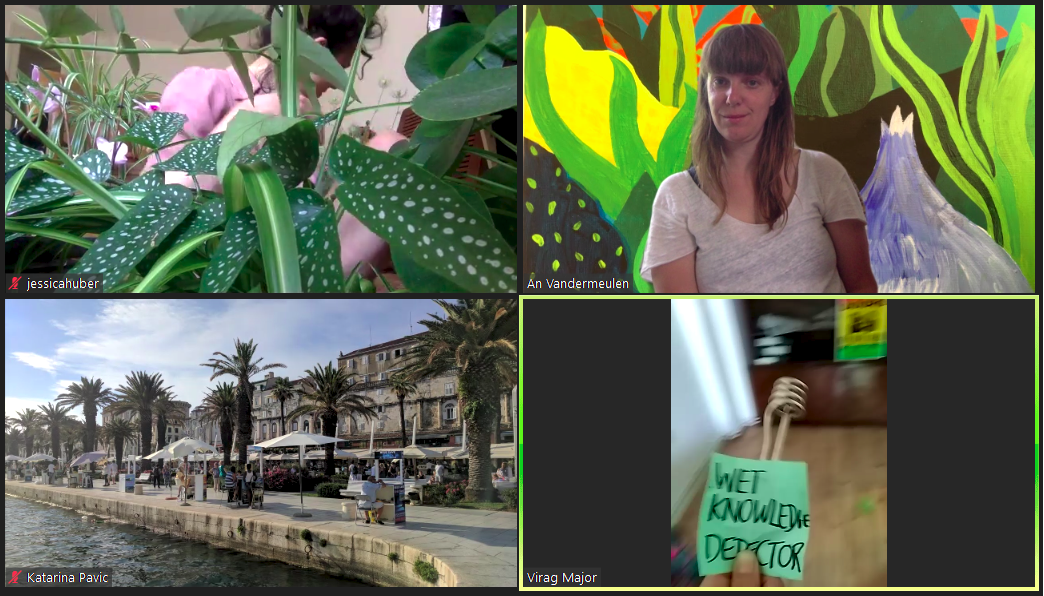
In the search for wet knowledge Virag Major in Berlin demonstrated the device that should detect wet knowledge and find an answer to the question: How do we find and share this wet knowledge? For example, wet knowledge can be brought to us through making sourdough, which is a knowledge that is lost due to the industrialization of bread making. This is the type of knowledge that requires lived experience, senses and lots of tries and errors.
From Berlin, we moved to Brussels, where An Vandermulen introduced us to the importance of a reading room, of a Tiny Reading Room describing how every house needs a tiny reading room, a room for one’s own one-on-one conversation.
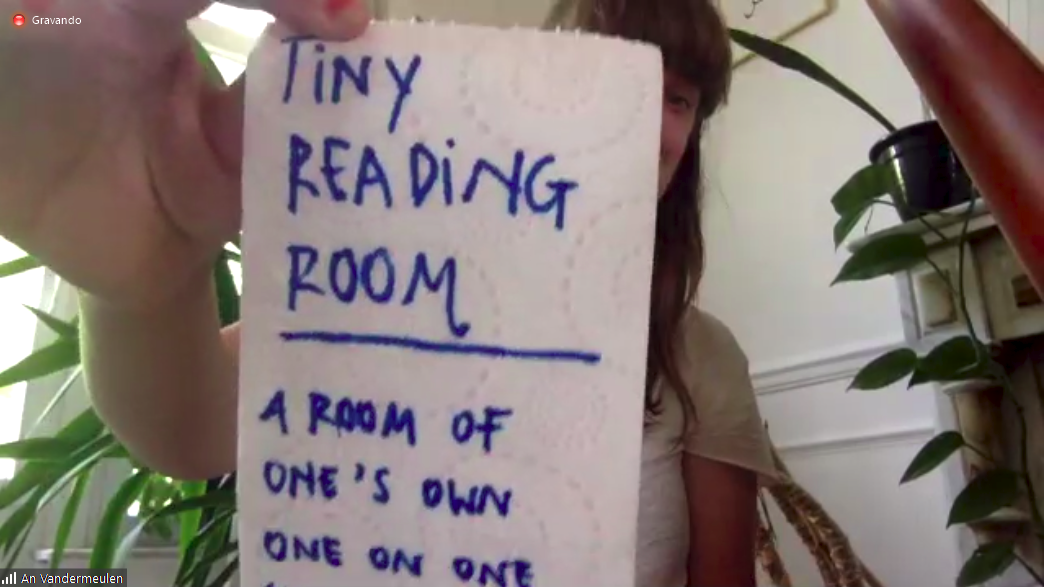
The Office for Developing Deviances
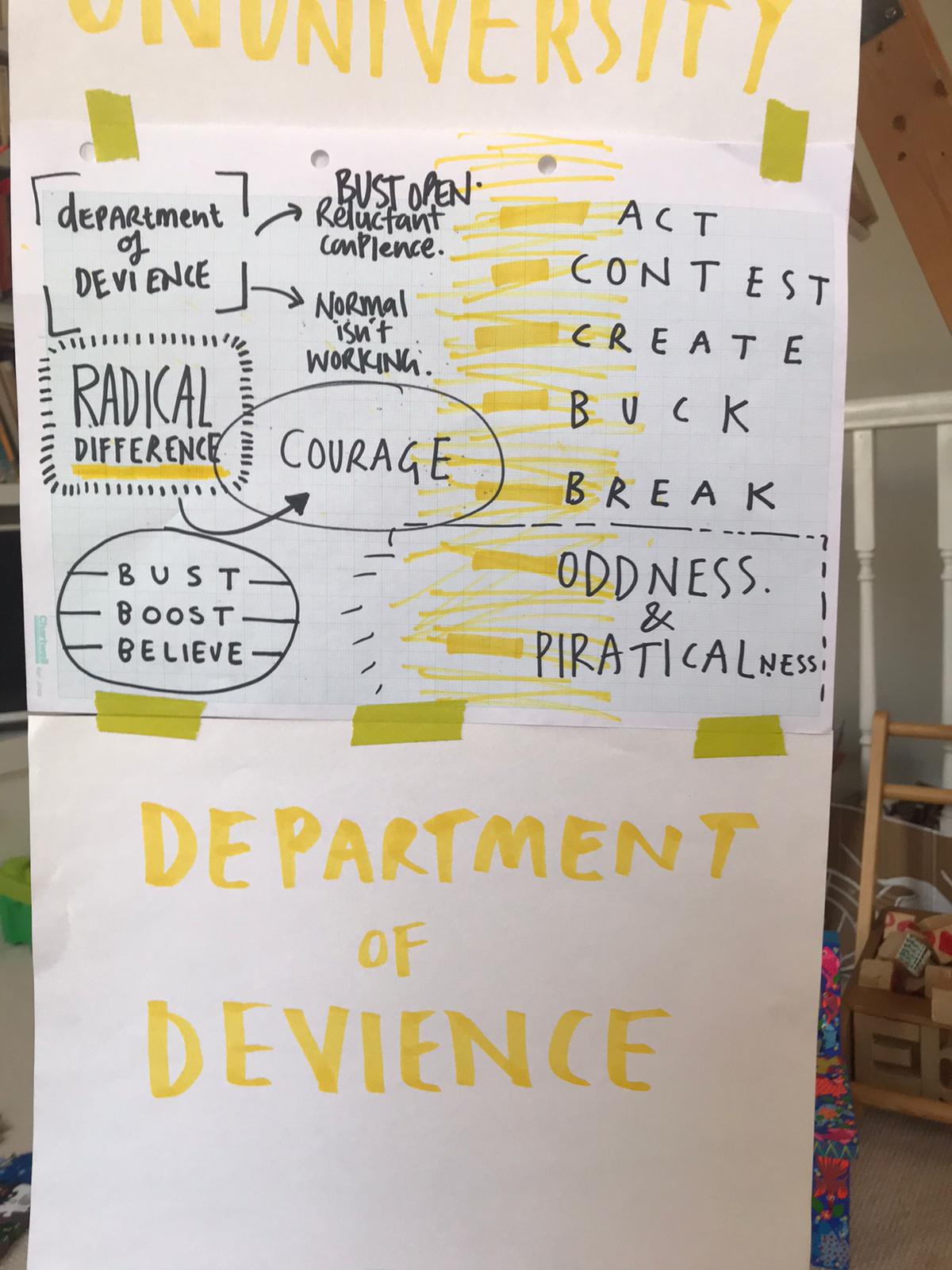
The last room we moved to was the Office for Developing Deviances, an office for developing design disruption or organizing delightfull dissent. This is the space to think and rethink about what it means to be not normal or to be odd; what it means to work with unorthodox creative approaches to the challenges that we’re all facing. This is the space to think about how we make infrastructure through acting differently, but probably most importantly to depart from normal in order to rethink what is normal, to not going back to normal. This room wishes to grow the idea of oddness and deviant capabilities to nurture and encourage positive deviance where people thrive against the norm and are able to generate and regenerate their own lives and communities according to what they actually care about. This space is a moral space, as much as the technical space, and it’s about capability to shape the future we all want to live in.
With normal ways not working any more, especially in this moment of crisis, in this time of apocalypse, what does this deviance look like? Here are three examples:
- an inclusive crossgenerationaly school, fashioned collaboratively inside the recently opened nuclear exclusion zone;
- a local currency invented by artists and activists to challenge conventional finance;
- accelerating gentrification and touristification tackled through creative artivists serving eviction notices on art galleries.
After the tour around the different rooms of the Department, Jessica Huber invited all of us to take part in a ritual that involved all our senses. She invited us to think together about the other rooms we could grow, or perhaps rooms that we need to grow. We were invited to switch off our videos and rename our Zoom names after the desired room, giving life to a condo of dreamed spaces, overcoming our individual self for a collaborative future looking hive. These were some of the ideas presented:
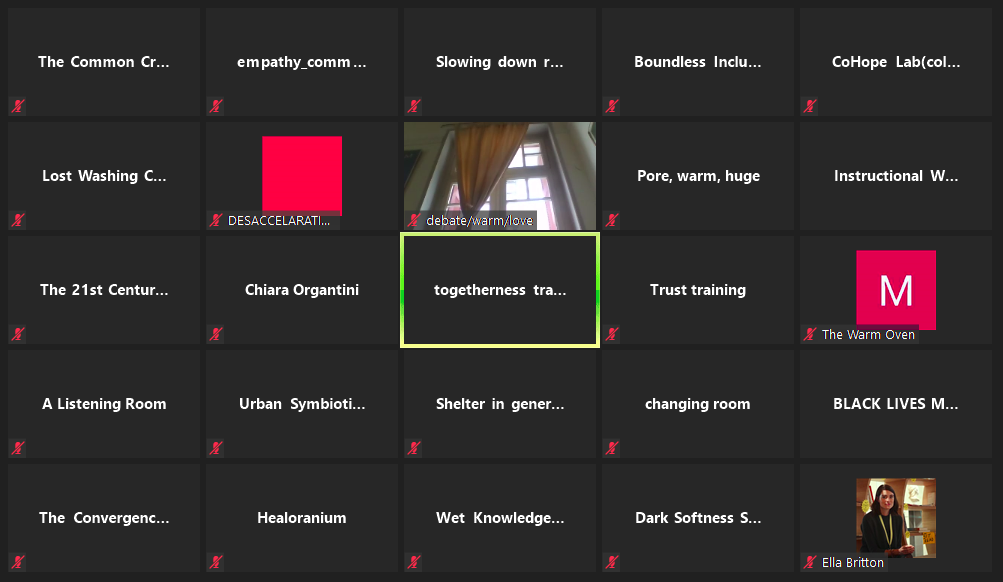
Shelter in Generous Solidarity
A room for comforting, listening and learning. This is the room that could be generous and could have food for everyone at all times. This would be the room to start over again together, in a non judgemental way, a room that is filled with a smell of a sincere apology and attention, a room that is a shelter.
Togetherness Training
Something that was probably needed a lot during the confinement because suddenly, we were all very distant.
Deacceleration accelerator
Having a deacceleration accelerator chamber is about having a place where deacceleration can be accelerated. It’s a room of ecological transition, degrowth or slow growth, a room where we’ll all participate based on the principles of solidarity and collaboration for mutual support and where people will share their resources.
Urban Symbiotic Witchcraft
A craft that would help reimagine our cities, that would help us interconnect our cities more, and rethink knowledge more as a magic craft, like witch craft, like a magic gesture or magic way of being together in our cities. In this way we could include human, non human and other elements in a more interconnected symbiotic way of loving together.
Healoranium
Healoranium is a room that helps you heal. Four weeks ago one of the Reshapers got into an accident and broke her elbow and hand. Since then, one room in her house has been her healing place and she decided to call it Healoranium. Her partner, who has been taking care of her, likes to save plants from the street and put them on a special place, a balcony, and calls this place a Sunatorium, so that room has become a Healoranoum for her.
Lost Washing Choir
A space where one could come in, the floor could be very soft and there would be loads of voices. A lot of small loudspeakers would play sounds of people sharing what they lost: the positive things, there are lots of things we lose that we’re also happy about; but also sad things. One could as well go in there and write down or draw what they’ve lost. There would be two small separate rooms. In one, there would be a little microphone where you could record your losses and you automatically become a part of a choir. In the second room there is a person with whom you can share your losses in person. This room is dedicated to finding a voice to express something, and not feel alone with that.
Social muscle gym
We try to train back our capability to stay together, but rather than pumping a muscle in a way they are toned, beautiful and spectacular, we tend to have them more elastic and long so as to be able to react and be flexible and be responsive to others and situations we jump into.
***
Sharing the ideas for different rooms for The Department for Civil Imagination was the end of this celebration, but at the same time the invitation to continue building, developing and maintaining the Department together.
Happy with what you’ve read? Send us more stuff like this!
